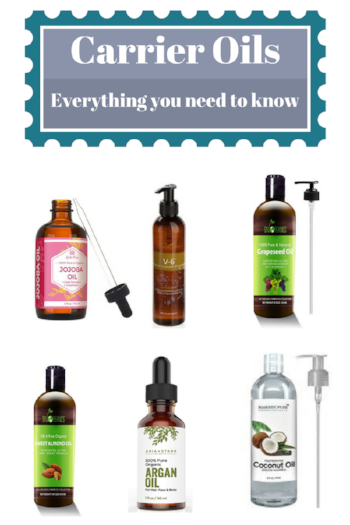Everything You Need to Know About Carrier Oils
/If you are new to the essential oil world, chances are that you have heard the term “carrier oil” thrown around. It can be difficult to keep the different carrier oils and their uses straight. To make doing your research easier, we have compiled everything you need to know about carrier oils into one post.
What is a carrier oil?
Simply put, a carrier oil is an oil that is used topically to dilute an essential oil. Carrier oils are derived from vegetarian sources. Some of the most common carrier oils are fractionated coconut oil, grapeseed oil, argan oil, sweet almond oil, jojoba oil, and Young Living’s V-6 oil. While most carrier oils have a slight scent, this scent is generally neutral and unobtrusive. Never put a carrier oil in your diffuser. Please do not ingest any of the carrier oils in this post.
Using Carrier Oils to Dilute Essential Oils
There are three main reasons to dilute essential oils for topical application:
- Extend the oil - Good quality essential oils can be expensive. Making a roller bottle or mixing an essential oil with carrier oil before applying it topically stretches the oil and makes it go further, allowing you to get the most bang for your buck. By using carrier oil you can use less of the essential oil but still receive all of the therapeutic benefits. Additionally, since essential oils tend to evaporate quickly, a carrier oil can ensure that the scent remains on your skin longer.
- To dilute a “hot oil” - Some oils are considered “hot.” This means that they feel warm on the skin. Using a carrier oil to dilute a hot oil ensures a comfortable application. Examples of hot oils include Peppermint, Cinnamon, Clove, and Oregano. Should you ever topically apply an undiluted “hot” oil, carrier oil can be used on top of the oil to soothe the skin.
- DIY beauty products - essential oils and carrier oils can be combined to make your own face serums, beard oils, scrubs, hair oils, and so much more.
Carrier oils and their properties:
Ultimately, which carrier oil you use for any given task is your decision. While some carrier oils are better suited for certain tasks, there is no wrong choice. It is not necessary to buy every oil we have listed here. One or two carrier oils is usually plenty unless you are looking at more complicated DIY projects that call for specific carriers. Use the descriptions and suggestions below to help you decide which carrier oil is best for you. For your convenience we have provided links to our carrier oils. All of the following, with the exception of V-6, are available on Amazon and eligible for Prime Shipping.
- Fractionated coconut oil: Fractionated coconut oil is coconut oil that remains liquid at room temperature. It is clear in color and does not have a noticeable smell. While coconut oil or fractionated coconut oil can be moisturizing on the lips or around the eyes, it may cause those with sensitive or acne prone skin to break out when used on other areas of the face. This oil is easily absorbed and won’t leave behind a greasy residue.
- Grapeseed oil: Although this oil takes longer to soak in and leaves a slight residue, it isn’t overly greasy. The consistency of this oil makes it perfect for massages or any other application that might require extra staying power.
- Argan oil: This oil is most commonly known for it’s use on hair and beards. It is easily absorbed into the shaft of the hair without leaving behind residue. Try adding your favorite essential oils for an easy DIY serum.
- Sweet almond oil: This oil has a light yellow color and a sweet, nutty aroma. It is a medium consistency. Sweet almond oil is perfect for moisturizing skin and is rich in Vitamin E. If you have a nut allergy, you may wish to use a different carrier oil.
- Jojoba oil: This oil has a tan hue, slightly nutty aroma, and medium consistency. It absorbs easily into the skin without leaving any residue. It won’t clog pores, making it perfect for DIY face serums.
- V-6 oil: V-6 is a blend of fractionated coconut oil, grapeseed oil, sweet almond oil, wheat germ oil, sunflower oil, and olive oil. Due to the fact that this is a blend of carrier oils with different viscosities, you will need to shake the bottle before use.








